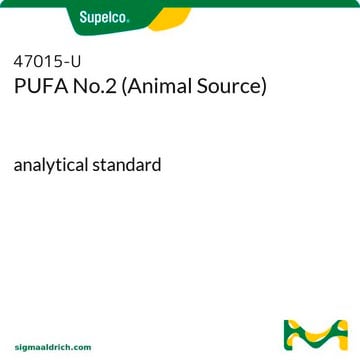91988
Acide tridécanoique
analytical standard
About This Item
Produits recommandés
Qualité
analytical standard
Niveau de qualité
Pureté
≥99.0% (GC)
Durée de conservation
limited shelf life, expiry date on the label
Technique(s)
HPLC: suitable
gas chromatography (GC): suitable
Point d'ébullition
236 °C/100 mmHg (lit.)
Pf
41-42 °C (lit.)
42-44 °C
Format
neat
Groupe fonctionnel
carboxylic acid
Conditions d'expédition
ambient
Température de stockage
room temp
Chaîne SMILES
CCCCCCCCCCCCC(O)=O
InChI
1S/C13H26O2/c1-2-3-4-5-6-7-8-9-10-11-12-13(14)15/h2-12H2,1H3,(H,14,15)
Clé InChI
SZHOJFHSIKHZHA-UHFFFAOYSA-N
Vous recherchez des produits similaires ? Visite Guide de comparaison des produits
Application
- analysis of pentaerythritol, phthalic acid and triglycerides in extracts from industrial alkyd resins using gas chromatography and high-performance liquid chromatography coupled to mass spectrometry
- quantification of metabolites of arachidonic acid from cultures of endothelial cells using high performance liquid chromatography coupled to mass spectrometry
Produits recommandés
Mention d'avertissement
Warning
Mentions de danger
Conseils de prudence
Classification des risques
Eye Irrit. 2 - Skin Irrit. 2 - STOT SE 3
Organes cibles
Respiratory system
Code de la classe de stockage
11 - Combustible Solids
Classe de danger pour l'eau (WGK)
WGK 3
Point d'éclair (°F)
235.4 °F - closed cup
Point d'éclair (°C)
113 °C - closed cup
Équipement de protection individuelle
dust mask type N95 (US), Eyeshields, Gloves
Faites votre choix parmi les versions les plus récentes :
Déjà en possession de ce produit ?
Retrouvez la documentation relative aux produits que vous avez récemment achetés dans la Bibliothèque de documents.
Les clients ont également consulté
Notre équipe de scientifiques dispose d'une expérience dans tous les secteurs de la recherche, notamment en sciences de la vie, science des matériaux, synthèse chimique, chromatographie, analyse et dans de nombreux autres domaines..
Contacter notre Service technique












